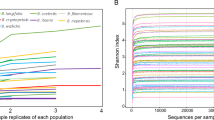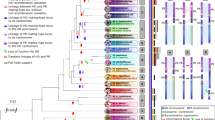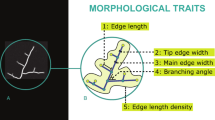Abstract
WE are grateful for the clear genetical interpretation of heterothallism given by Dr. K. Mather1, and may perhaps be allowed to carry his conclusions regarding reproduction in fungi a step further. We have been thinking on these lines for some time, and in a joint discussion held by Sections D and K at a meeting of the British Association in 1937, the suggestion put forward by one of us2, that the heterothallism of some fungi might be compared with the incompatibility of some angiosperms, was not received sympathetically by the mycologists.
This is a preview of subscription content, access via your institution
Access options
Subscribe to this journal
Receive 51 print issues and online access
$199.00 per year
only $3.90 per issue
Buy this article
- Purchase on SpringerLink
- Instant access to full article PDF
Prices may be subject to local taxes which are calculated during checkout
Similar content being viewed by others
References
Mather, D. K., NATURE, 149, 64 (1942).
Madge, M. A. P., B. A. Report Nottingham, 423 (1937).
Ames, L. M., Mycologia, 26, 392 (1934).
Dodge, B. O., Mycologia, 28, 284 (1936).
Dodge, B. O., Mycologia, 27, 418 (1935).
Author information
Authors and Affiliations
Rights and permissions
About this article
Cite this article
MADGE, M., BLACKWELL, E. Heterothallism and Reproduction in Fungi. Nature 149, 440–441 (1942). https://doi.org/10.1038/149440b0
Issue date:
DOI: https://doi.org/10.1038/149440b0



